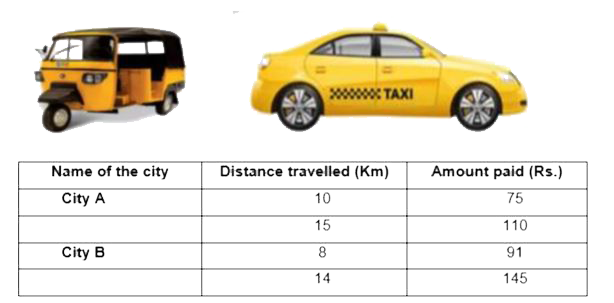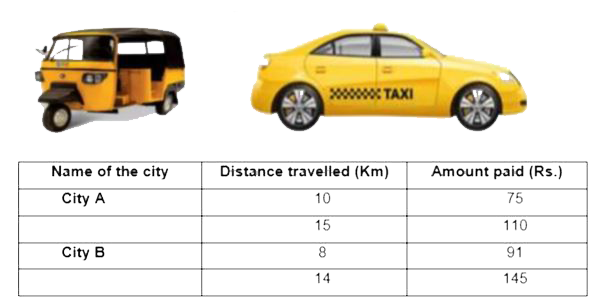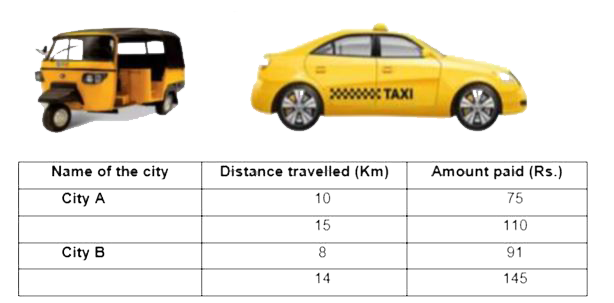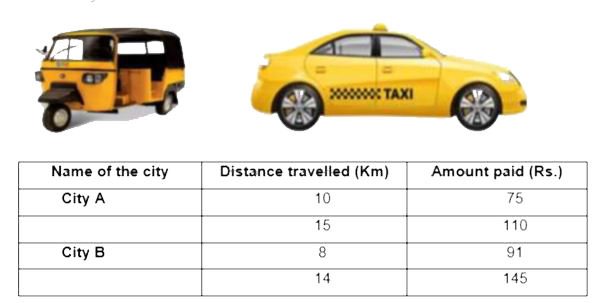The taxi charges in a city comprise of a fixed charge, together with the charge of the distance covered. For a journey of 16 km, the charges paid are Rs 156 and for a journey of 24 km, the charges paid are Rs 204. What will a person have to pay for travelling a distance of 30 km? (a) Rs 236 (b) Rs 240 (c) Rs 248 (d) Rs 252
To solve the problem, we need to determine the fixed charge and the variable charge per kilometer for the taxi service. We can set up equations based on the information provided.
1. Define Variables:
- Let x be the fixed charge (in Rs).
- Let y be the charge per kilometer (in Rs).
2. Set Up Equations:
- For the first journey of 16 km, the total charge is given as Rs 156:
x+16y=156(Equation 1)
- For the second journey of 24 km, the total charge is given as Rs 204:
x+24y=204(Equation 2)
3. Subtract the Equations:
- To eliminate x, subtract Equation 1 from Equation 2:
(x+24y)−(x+16y)=204−156
- This simplifies to:
8y=48
- Solving for y:
y=488=6
4. Substitute y Back to Find x:
- Substitute y=6 back into Equation 1:
x+16(6)=156
- This simplifies to:
x+96=156
- Solving for x:
x=156−96=60
5. Calculate the Charge for 30 km:
- Now that we have both x and y, we can calculate the charge for a journey of 30 km:
Total charge=x+30y
- Substituting the values:
Total charge=60+30(6)=60+180=240
Final Answer:
The person will have to pay Rs 240 for traveling a distance of 30 km.
- Let x be the fixed charge (in Rs).
- Let y be the charge per kilometer (in Rs).
- For the first journey of 16 km, the total charge is given as Rs 156:
x+16y=156(Equation 1)
- For the second journey of 24 km, the total charge is given as Rs 204:
x+24y=204(Equation 2)
- To eliminate x, subtract Equation 1 from Equation 2:
(x+24y)−(x+16y)=204−156
- This simplifies to:
8y=48
- Solving for y:
y=488=6
- Substitute y=6 back into Equation 1:
x+16(6)=156
- This simplifies to:
x+96=156
- Solving for x:
x=156−96=60
- Now that we have both x and y, we can calculate the charge for a journey of 30 km:
Total charge=x+30y
- Substituting the values:
Total charge=60+30(6)=60+180=240
The person will have to pay Rs 240 for traveling a distance of 30 km.
Similar Questions
The car hire charges in a city comprise of a fixed charges together with the charge for the distance covered. For a journey of 12 km, the charge paid is Rs 89 and for a journey of 20 km, the charge paid is Rs 145. What will a person have to pay for travelling a distance of 30 km?
View SolutionThe taxi charges in a city comprise of a fixed charge together with the charge for the distance covered. For a journey of 10 km the charge paid is Rs 75 and for a journey of 15 km the charge paid is Rs 110. What will a person have to pay for travelling a distance of 25 km?
View Solution
Knowledge Check
A private taxi company charges a fixed charge along with a per kilometre charge based on the distance covered. For a journey of 24 km, the charges paid are Rs. 368 and for a journey of 32 km, the charges paid Rs. 464. How much will a person have to pay for travelling a distance of 15 km?
ARs. 180BRs. 260CRs. 290DRs. 280The autorickshaw fare consists of a fixed charge together with the charge for the distance covered. For a journey of 10 km, the charge paid is 85 and for a journey of 15 km, the charge paid is 120. The fare for a journey of 25 km will be
A175B190C180D225
The taxi charges in a city consist of a fixed charge together with the charge for the distance covered. For a distance of 20 km, the charge paid is 205 and for a distance of 25 km, the charge paid is 255. Find the fixed charges and the charge per km. How much does a person have to pay for covering a distance of 50 km? Sol. Let the fixed charges be x and charge per km be y.
View Solution[" (IV) The taxi charges in a city consist of a fixed charge together with the charge for the "],[" distance covered.For a distance of "10km" ,the charge paid is "₹105" and for a "],[" journey of "15km" ,the charge paid is "₹155" .What are the fixed charges and the "],[" charge per km? How much does a person have to pay for travelling a distance of "],[25km" ? "]
View SolutionIt is common that Governments revise travel fares from time to time based on various factors such as inflation ( a general increase in prices and fall in the purchasing value of money) on different types of vehicles like auto, Rickshaws, taxis, Radio cab etc. The auto charges in a city comprise of a fixed charge together with the charge for the distance covered. Study the following situations

Situation 1: In city A, for a journey of 10 km, the charge paid is Rs 75 and for a journey of 15 km, the charge paid is Rs 110.
Situation 2: In a city B, for a journey of 8km, the charge paid is Rs91 and for a journey of 14km, the charge paid is Rs 145.
The graph of lines representing the conditions are: (situation 2)
View SolutionIt is common that Governments revise travel fares from time to time based on various factors such as inflation ( a general increase in prices and fall in the purchasing value of money) on different types of vehicles like auto, Rickshaws, taxis, Radio cab etc. The auto charges in a city comprise of a fixed charge together with the charge for the distance covered. Study the following situations

Situation 1: In city A, for a journey of 10 km, the charge paid is Rs 75 and for a journey of 15 km, the charge paid is Rs 110.
Situation 2: In a city B, for a journey of 8km, the charge paid is Rs91 and for a journey of 14km, the charge paid is Rs 145.
Refer to situation 2:
What will a person have to pay for travelling a distance of 30km?
View SolutionIt is common that Governments revise travel fares from time to time based on various factors such as inflation ( a general increase in prices and fall in the purchasing value of money) on different types of vehicles like auto, Rickshaws, taxis, Radio cab etc. The auto charges in a city comprise of a fixed charge together with the charge for the distance covered. Study the following situations

Situation 1: In city A, for a journey of 10 km, the charge paid is Rs 75 and for a journey of 15 km, the charge paid is Rs 110.
Situation 2: In a city B, for a journey of 8km, the charge paid is Rs91 and for a journey of 14km, the charge paid is Rs 145.
If the fixed charges of auto rickshaw be Rs x and the running charges be Rs y km/hr, the pair of linear equations representing the situation is
View SolutionIt is common that Governments revise travel fares from time to time based on various factors such as inflation ( a general increase in prices and fall in the purchasing value of money) on different types of vehicles like auto, Rickshaws, taxis, Radio cab etc. The auto charges in a city comprise of a fixed charge together with the charge for the distance covered. Study the following situations

Situation 1: In city A, for a journey of 10 km, the charge paid is Rs 75 and for a journey of 15 km, the charge paid is Rs 110.
Situation 2: In a city B, for a journey of 8km, the charge paid is Rs91 and for a journey of 14km, the charge paid is Rs 145.
Refer to situation 1:
A person travels a distance of 50km. The amount he has to pay is
View Solution
